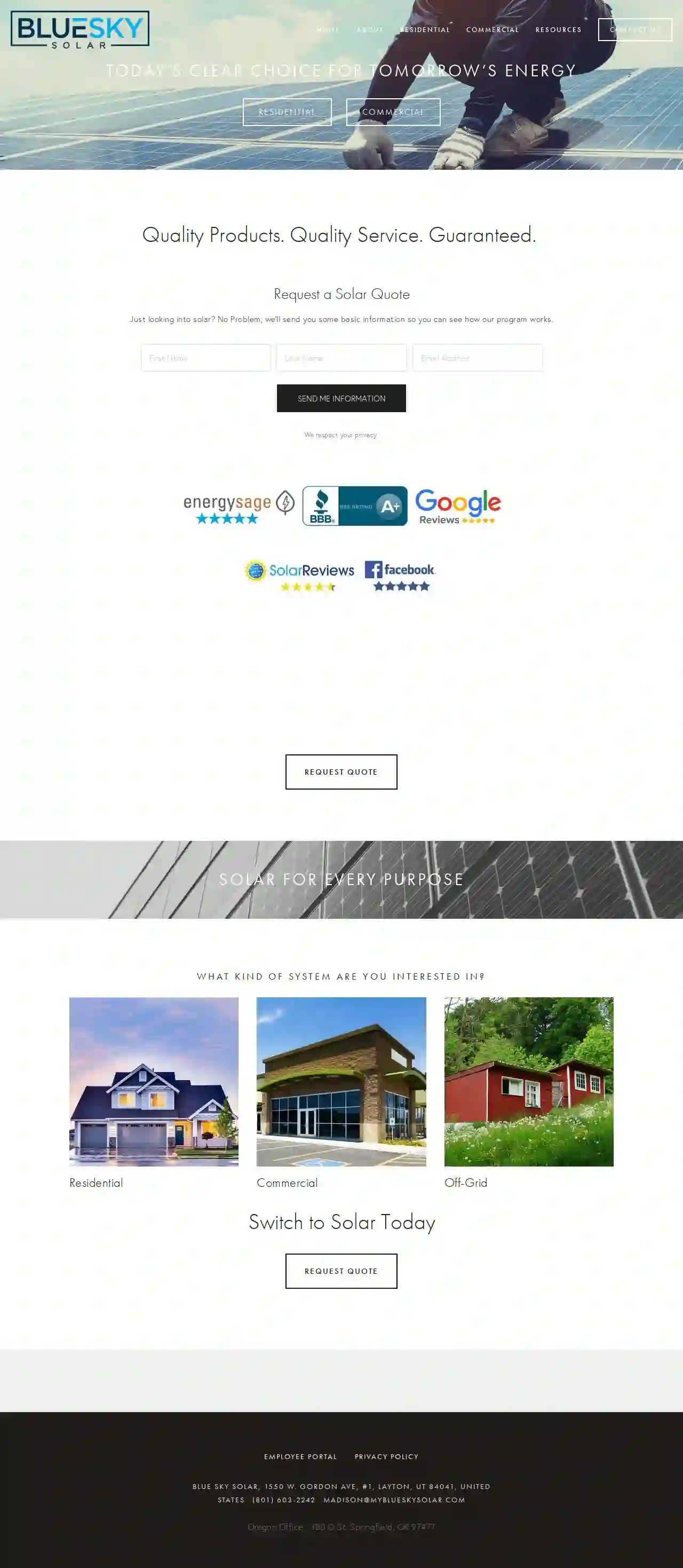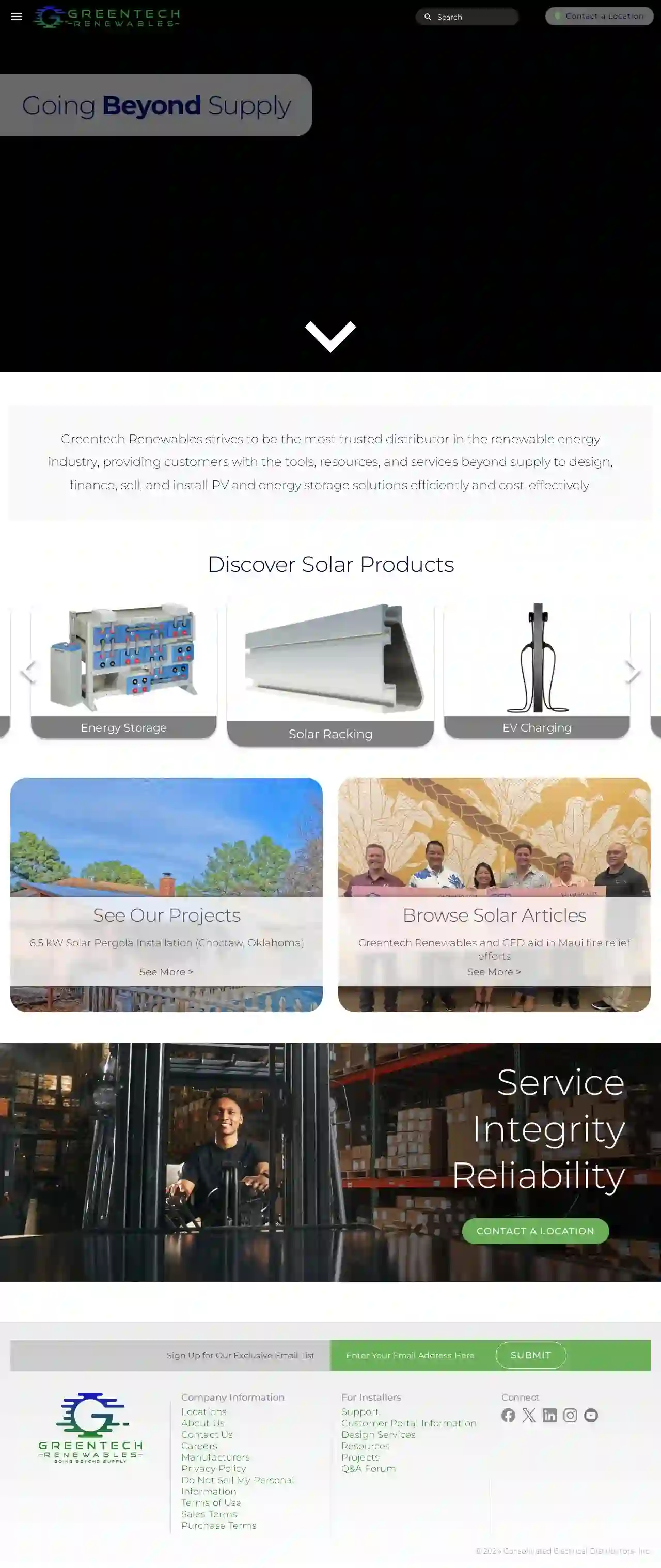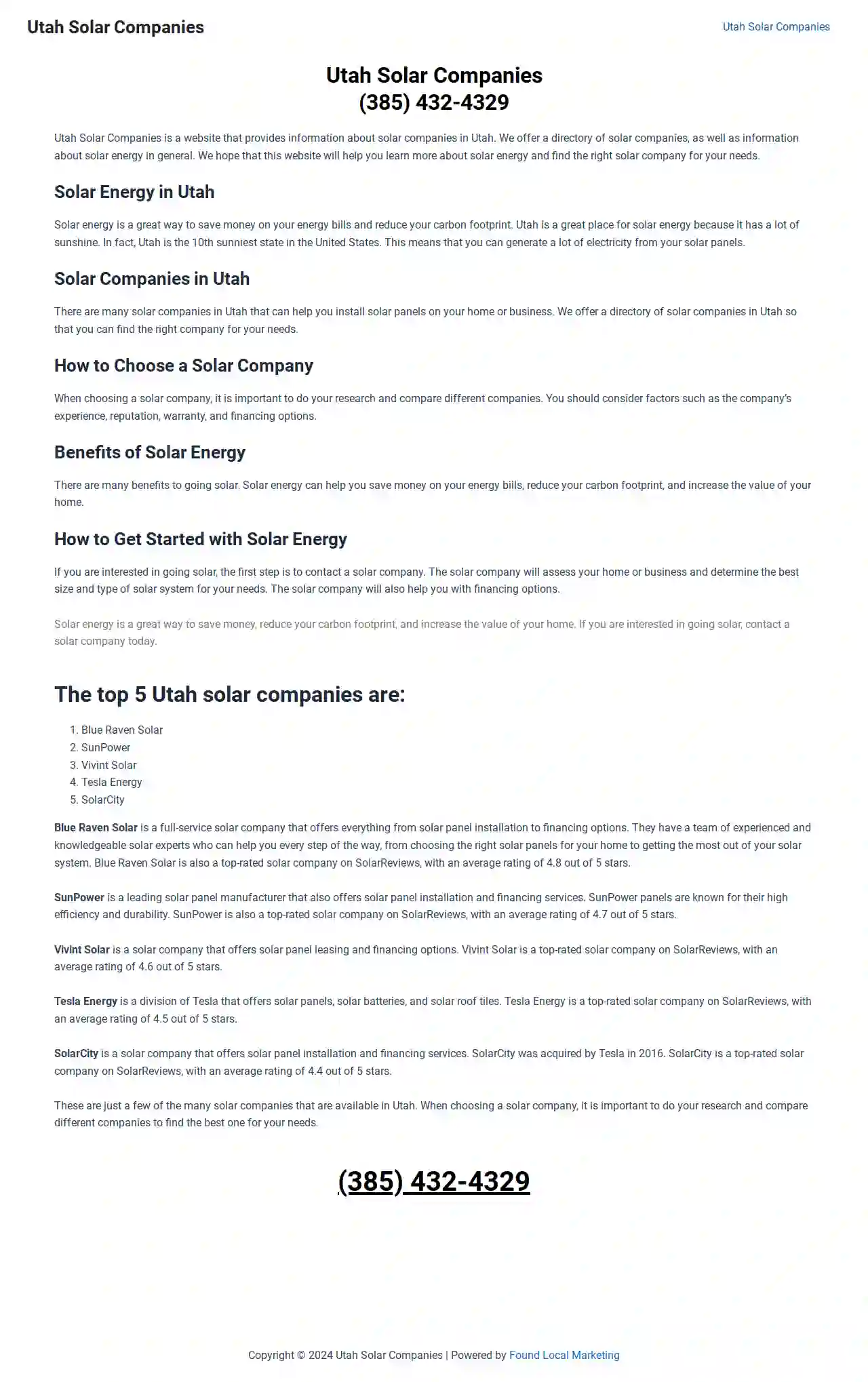Commercial Solar Installers Provo
Find the best Commercial Solar Energy in Provo
Get multiple Solar for Businesses quotes for your project today! Compare profiles, reviews, accreditations, portfolio, etc... and choose the best deal.

American Solar Power
52 reviews2337 Bonanza Ct., South Jordan, UT, 84095, USAmerican Solar Power is a family-owned company with offices in South Jordan and Moab, Utah. They specialize in designing and installing solar systems for both residential and commercial properties. With over 20 years of experience, they offer honest advice about whether solar is right for you and what your savings will be. They provide a variety of services including on and off grid design and installation, small scale wind power design and installation, site estimates and analysis, utility and government incentive application assistance, system designs by a licensed electrical engineer, and several years of design and installation experience of solar products.
- Services
- Why Us?
- Accreditations
- Our Team
- Testimonials
- Gallery
Get Quote
Gardner Energy
4.669 reviews123 Main St, Suite 100, Salt Lake City, 84101, USGardner Energy is a team of energy enthusiasts dedicated to providing modern energy solutions to the residential and commercial markets. They are on the forefront of using proven, dependable technology to improve customers' lives, homes, and businesses. With over 20 years of experience in the energy industry, they have helped establish the solar industry and continue to support customers as it evolves.
- Services
- Why Us?
- Accreditations
- Our Team
- Testimonials
- Gallery
Get Quote
Blue Sky Solar, LLC
4.927 reviews1550 W. Gordon Ave, #1, Layton, 84041, USBlue Sky Solar is a leading provider of solar energy solutions, offering a range of services including residential and commercial solar installations, solar financing, and products and warranties. With a focus on staying current with technology and embracing a wider view of renewable energy, Blue Sky Solar sets itself apart from other companies in the industry. The company has built relationships with top manufacturers, allowing them to offer quality products and competitive pricing. Local installation teams ensure that clients receive the best care possible for their renewable energy needs.
- Services
- Why Us?
- Accreditations
- Our Team
- Testimonials
- Gallery
Get Quote
Rocky Mountain Solar Company
58 reviews1234 Solar Way, West Jordan, UT, 84081, USRocky Mountain Solar Company is West Jordan, Utah's premier Solar Company, offering unrivaled standards of solar services to our local communities! As passionate believers in the exciting future that solar power offers us globally, we are proud to provide a diverse range of services to local people that are widely considered the best around. We are known to be reliable, and supportive, and to achieve results of the highest quality. Our team works hard to be able to offer exactly what people need, including solar panel setup options that meet all practical requirements, budgets, and uses. From running your home in an off-grid setup to EV Chargers to Battery services, Maintenance, Cleaning, and more, our services have been designed to achieve optimum results just for you.
- Services
- Why Us?
- Accreditations
- Our Team
- Testimonials
- Gallery
Get Quote
ES Solar
4.7Layton, UT, 245 E 2150 N, 84041, USES Solar is a leading provider of solar energy solutions, offering a range of services including residential and commercial solar installations, the Wattsmart Program, and educational resources through their blog and solar by state guides. With a strong commitment to customer satisfaction, ES Solar has earned a 4.7-star rating from over 2,000 Google reviews. Their team of experts is dedicated to helping customers achieve energy independence and reduce their environmental footprint.
- Services
- Why Us?
- Accreditations
- Our Team
- Testimonials
- Gallery
Get Quote
Greentech Renewables Salt Lake City
123 Solar Way, Suite 100, Beverly Hills, 90210, USGreentech Renewables strives to be the most trusted distributor in the renewable energy industry, providing customers with the tools, resources, and comprehensive services to design, finance, sell, and install PV and energy storage solutions efficiently and cost-effectively. Our core values of 'Service, Integrity, and Reliability' shape our culture in our commitment to cultivating genuine customer relationships.
- Services
- Why Us?
- Accreditations
- Our Team
- Testimonials
- Gallery
Get Quote
1Solar
3.9247 reviewsFarmington, UT, 819 Lagoon Dr, 84025, US1Solar is a full-service solar contractor with over a decade of experience in the solar industry. They offer a range of services including solar system installation, solar battery installation, solar repair and servicing, electric vehicle chargers, remove and replace panels, and solar diagnostics and monitoring. Their team of experts is dedicated to providing exceptional service and ensuring that all installations meet code and are built to last.
- Services
- Why Us?
- Accreditations
- Our Team
- Testimonials
- Gallery
Get Quote
Second Sun Solar
3.36 reviews848 West 1455 North, Unit 120, N/A, Logan, 84321, USSecond Sun Solar is a family-owned business that has been proudly serving customers in Utah, Idaho, and Wyoming for over 12 years. They specialize in using the latest technology in solar panels and energy storage systems to provide customers with highly efficient and reliable energy solutions tailored to their specific needs. Second Sun Solar is dedicated to maintaining high standards in every aspect of their business, ensuring customer satisfaction and reliability.
- Services
- Why Us?
- Accreditations
- Our Team
- Testimonials
- Gallery
Get Quote
Salt Lake City UT Solar Panels Rates - Panels Installation
123 Main St, Suite 100, Salt Lake City, 84101, USUtah Solar Companies is a website that provides information about solar companies in Utah. We offer a directory of solar companies, as well as information about solar energy in general. We hope that this website will help you learn more about solar energy and find the right solar company for your needs.
- Services
- Why Us?
- Accreditations
- Our Team
- Testimonials
Get Quote
Apollo Energy
544 reviewsN/A, USApollo Energy is a one-stop shop for solar, battery, and generator solutions. They offer design, installation, and maintenance services for residential, commercial, and off-grid energy systems. Their team of master electricians and general contractors ensure transparency in performance, expectations, and pricing. They provide a warranty that includes monitoring and servicing any issues that may arise after installation.
- Services
- Why Us?
- Accreditations
- Gallery
Get Quote
Over 4,210+ Solar Installers in our network
Our solar pros operate in Provo & beyond!
SolarCompaniesHub has curated and vetted Top Solar Installers in and around Provo. Find a reliable business today.
Frequently Asked Questions About Commercial Solar Installations
- Uses high-quality mounting hardware
- Follows industry best practices
- Has a good understanding of roofing systems
- Efficiency: Higher-efficiency panels produce more energy from the same amount of sunlight, but they may have a higher upfront cost.
- Space Availability: If you have limited roof or ground space, higher-efficiency panels allow you to maximize energy production.
- Aesthetics: Consider the visual appearance of the panels and how they integrate with your building or surroundings. Monocrystalline panels tend to have a more sleek and modern look, while polycrystalline panels have a more traditional blue appearance.
- Cost: Polycrystalline panels are generally more budget-friendly, while monocrystalline panels tend to be more expensive.
- Durability and Warranty: All types of solar panels are designed to be durable, but some manufacturers offer longer warranties or better performance guarantees.
- Site Assessment and Consultation: A qualified Commercial Solar Installers will visit your property to assess your energy needs, roof or ground suitability, and discuss your project goals.
- System Design and Proposal: The installer will design a solar system that meets your requirements and provides a detailed proposal outlining the system size, cost, expected energy production, and financial incentives.
- Financing and Incentives: Explore financing options, such as solar loans, leases, or PPAs, and identify applicable tax credits or rebates to make your project more affordable.
- Permitting and Approvals: The installer will obtain necessary permits and approvals from your local building department and utility company.
- Installation: The solar panels, inverters, wiring, and other components will be installed according to the approved design.
- Interconnection and Commissioning: The system will be connected to the grid, and the utility company will conduct final inspections and activate your system.
- Monitoring and Maintenance: Your solar system will typically be monitored remotely for performance. The installer or a maintenance provider will handle any necessary maintenance or repairs.
- Reduce Carbon Footprint: Solar energy helps mitigate climate change by reducing carbon dioxide and other greenhouse gas emissions associated with traditional fossil fuel-based electricity generation.
- Improve Air Quality: Solar energy does not produce air pollutants, such as sulfur dioxide or nitrogen oxides, which contribute to smog, acid rain, and respiratory problems.
- Conserve Water Resources: Solar energy production does not require water, unlike traditional power plants, which often consume significant amounts of water for cooling.
- Reduce Land Use Impact: While solar installations do require land, they can be integrated with existing structures (rooftops) or placed on underutilized land, minimizing environmental disruption.
Will solar panels affect my roof warranty?
How do I choose the right solar panel type for my business?
What is the process for installing a commercial solar system?
How do commercial solar panels affect the environment?
Will solar panels affect my roof warranty?
- Uses high-quality mounting hardware
- Follows industry best practices
- Has a good understanding of roofing systems
How do I choose the right solar panel type for my business?
- Efficiency: Higher-efficiency panels produce more energy from the same amount of sunlight, but they may have a higher upfront cost.
- Space Availability: If you have limited roof or ground space, higher-efficiency panels allow you to maximize energy production.
- Aesthetics: Consider the visual appearance of the panels and how they integrate with your building or surroundings. Monocrystalline panels tend to have a more sleek and modern look, while polycrystalline panels have a more traditional blue appearance.
- Cost: Polycrystalline panels are generally more budget-friendly, while monocrystalline panels tend to be more expensive.
- Durability and Warranty: All types of solar panels are designed to be durable, but some manufacturers offer longer warranties or better performance guarantees.
What is the process for installing a commercial solar system?
- Site Assessment and Consultation: A qualified Commercial Solar Installers will visit your property to assess your energy needs, roof or ground suitability, and discuss your project goals.
- System Design and Proposal: The installer will design a solar system that meets your requirements and provides a detailed proposal outlining the system size, cost, expected energy production, and financial incentives.
- Financing and Incentives: Explore financing options, such as solar loans, leases, or PPAs, and identify applicable tax credits or rebates to make your project more affordable.
- Permitting and Approvals: The installer will obtain necessary permits and approvals from your local building department and utility company.
- Installation: The solar panels, inverters, wiring, and other components will be installed according to the approved design.
- Interconnection and Commissioning: The system will be connected to the grid, and the utility company will conduct final inspections and activate your system.
- Monitoring and Maintenance: Your solar system will typically be monitored remotely for performance. The installer or a maintenance provider will handle any necessary maintenance or repairs.
How do commercial solar panels affect the environment?
- Reduce Carbon Footprint: Solar energy helps mitigate climate change by reducing carbon dioxide and other greenhouse gas emissions associated with traditional fossil fuel-based electricity generation.
- Improve Air Quality: Solar energy does not produce air pollutants, such as sulfur dioxide or nitrogen oxides, which contribute to smog, acid rain, and respiratory problems.
- Conserve Water Resources: Solar energy production does not require water, unlike traditional power plants, which often consume significant amounts of water for cooling.
- Reduce Land Use Impact: While solar installations do require land, they can be integrated with existing structures (rooftops) or placed on underutilized land, minimizing environmental disruption.